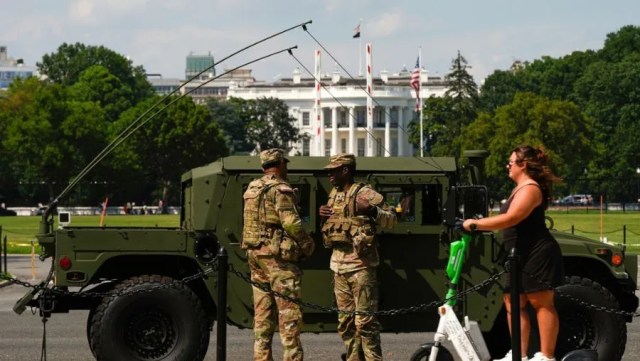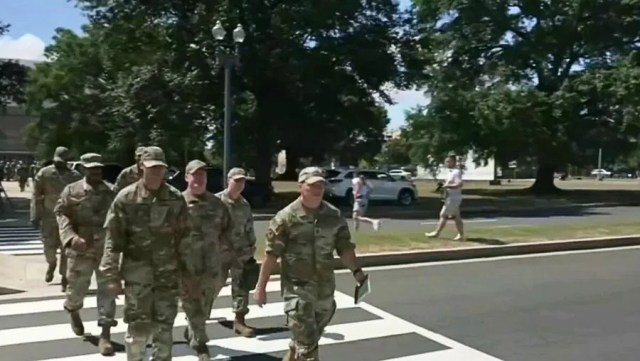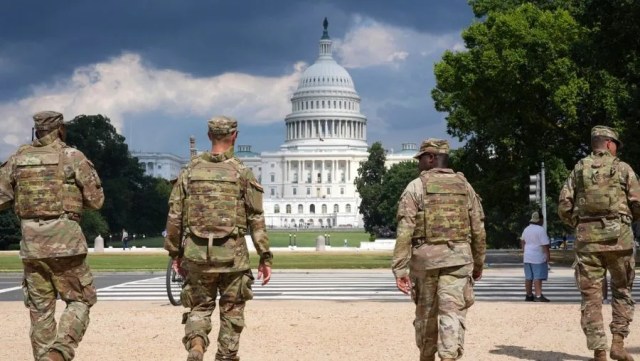What drives a president to cover the capital of his own country with soldiers from three different states? The answer does not lie in the officially cited reasons of crime and homelessness, but in a deeper fear of political opposition and democratic control.

Trump’s recent militarization of Washington reveals a frightening reality: a president who is afraid of the very city he is supposed to govern. The deployment of 650 to 750 additional National Guardsmen from West Virginia, South Carolina, and Ohio to the 800 D.C. Guardsmen already stationed there is not only disproportionate - it is constitutionally questionable and politically revealing.

The pretext of combating homelessness and crime collapses under closer scrutiny. Violent crime in Washington is lower than during Trump’s first term - a fact even documented by the city administration. To fight homelessness you need social workers, therapists, and affordable housing, not heavily armed soldiers. The cynical irony that the “cleanup” scheduled for 10 a.m. - a euphemism for the systematic displacement of homeless people - is to receive military support shows the cold-bloodedness of this operation. What really lies behind this unprecedented show of force becomes clear through Trump’s own words: he complains about the “inability of the city government to maintain public order” and the resulting obstruction of the “efficient functioning of the federal government.” Translated, that means: Trump cannot bear that the predominantly Democratic capital opposes him politically.

The legal basis for this takeover is more than questionable. Although the special federal laws for Washington D.C. allow for extensive presidential control, the federalization of local police forces and the deployment of National Guard units from other states for “crime fighting” lies in a constitutional gray area. The failed attempt to install the DEA chief as “emergency police commissioner” shows that even Trump’s own administration sought to exceed the boundaries of what is legally possible.

Particularly perfidious is the instrumentalization of Republican governors like Patrick Morrisey, Henry McMaster, and Mike DeWine, who willingly provided their state guards. Their soldiers become tools of a political vendetta against a democratically elected city government. The contrast with Vermont, whose Republican governor Phil Scott rejected the request and does not view the “enforcement of domestic laws” as an appropriate use of the National Guard, makes the submissiveness of the others all the more obvious.

The protests at Dupont Circle, where demonstrators carried banners reading “No fascist takeover of D.C.” and “No military occupation,” strike at the heart of the matter. What is happening here is not crime fighting, but political intimidation. The armed soldiers at Union Station, the “visibility of law enforcement authorities to deter violent crime” - these are images one knows more from authoritarian regimes than from the capital of the “free world.”
Trump’s timing is no coincidence. After his controversial meeting with Putin in Alaska he stages himself as a strongman who “restores order.” The militarization of Washington sends a clear message to all democratic institutions: resistance will be met with force, even if that force comes in the form of uniformed soldiers who theoretically cannot make arrests, but very much “may be armed.” Mayor Muriel Bowser hits the nail on the head when she writes that “our limited self-government has never faced such a test.” What she diplomatically calls a “test” is in truth a systematic assault on democratic principles. The city that is supposed to house the heart of American democracy is becoming a hostage to presidential paranoia.

The real question is not whether Trump has the right to take these measures - the legal loopholes exist. The question is what it says about a president who only feels safe when surrounded by soldiers. Trump’s fear of Washington is the fear of an autocrat toward the people he is supposed to represent. His “restoration of pride and beauty” in the capital in truth means the eradication of all visible opposition.

If a president needs 1,500 soldiers to feel safe in his own capital, then the problem is not the city - then the president is the problem. And if American governors willingly help to militarize their neighboring capital, then it shows how far the erosion of democratic norms has already advanced.
Investigative journalism requires courage, conviction – and your support.

Natürlich sind republikanische Gouverneure gerne bereit ihrem Idol, Ihrem „Gott“ zur Seite zu stehen.
Man muss nur schauen, welche Staaten es sind. Südstaatenstaaten, die wohl immer noch von der Rückkehr zur Rassentrennung und Sklaverei träumen.
Staaten, die auch öfter von Naturkastrophen heimgesucht werden.
Texas zeigt aber, dass Trumptreue in der Hinsicht nicht belohnt wird.
Vermont ist ein Nordstaat. Dem Gouverneur gratuliere ich und hoffe, dass er weiter resistent bleibt.
Ich war 2013 das letzte Mal in DC.
Ich habe mich nie unsichere geführt, obwohl wir bis in die später Abendstunden unterwegs waren.
1500 Nationalgardisten gegen ein paar Obdachlose und eine handvoll Kriminelle.
Es ist absurd.
Aber MAGA jubelt, wie immer: „best president“, „way to go“, „he makes our county safe and beautiful again“.
Das Traurige ist aber, dass aus der westlichen Welt, wie immer, gar nichts kommt.
Man will Trump ja nicht verärgern vor dem Treffen morgen.
Da übersieht man die übermächtige Militärpräsenz geflissentlich.
Selensky wird es an die von Russen eingenommenen Städte erinnern.
Trump demonstriert Stärke (den Tipp hat er bestimmt von Putin) gegenüber der eigenen Bevölkerung und gegenüber den westlichen Staatsleuten.
Da steckt auch ein gewisses Kalkül der Einschüchterung dahinter.
Putin wird mit roten Teppich, Applause und Umarmung begrüßt.
Die Delegation am morgigen Tag nur mit Limousinen und die Sicht auf schwrtbewaffnete Militärs.
Größer könnte die Diskrepanz nicht sein.
Deutliche könnte Trump bicht zeigen, wenn er respektiert und wen er als „schwächliche Bittsteller“ ansieht.
Wer sich von morgen etwas wirklich konstruktiven erhofft, ist naiv.
man kann nur hoffen, dass es bicht wieder zum Eklat kommt und Trump Delensky vorführt.
Da er bei Putin trotz aller Schmeichelei nicht wirklich was erreicht hat, braucht er dringend einen starken Moment, da kommt ihm Selensky gerade recht.
Wir werden sehen welches Grauen uns morgen erwartet.
ja, wir haben auch schon in d.c. eingecheckt